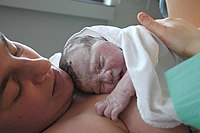
Photo from wikipedia
Abstract Study purpose Sensorimotor interventions in preterm neonates help to tackle feeding problems. This study was aimed to find out whether combined modalities of prefeeding stimulation were better than the… Click to show full abstract
Abstract Study purpose Sensorimotor interventions in preterm neonates help to tackle feeding problems. This study was aimed to find out whether combined modalities of prefeeding stimulation were better than the conventional methods of kangaroo mother care and non-nutritive sucking, with regards to transition time, duration of hospital stay and feeding behavior in early preterm babies. Methods Sixty new-born babies in the gestational age of 28–32 weeks, were randomized to receive either combined methods of stimulation (n = 30) or conventional methods alone (n = 30). Results There was a significant reduction in the duration of hospital stay in the interventional group compared to the control group (p = 0.008). There were no significant differences in the time duration taken to attain full oral feeds, mean weight gain per day, the mean number of sucks in the initial 5 min of feeding and mean amount of milk spillage per feed. Conclusion Combined methods of prefeeding stimulation resulted in earlier discharge and shorter duration of hospital stay in early preterm babies.
Journal Title: Journal of Neonatal Nursing
Year Published: 2020
Link to full text (if available)
Share on Social Media: Sign Up to like & get
recommendations!